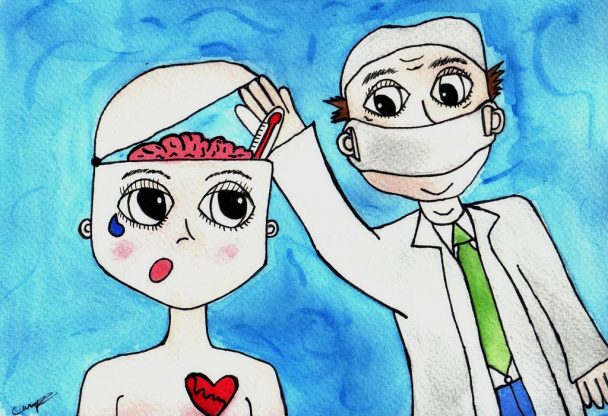
Justin Chassin is a senior computer science and applied math and statistics double major.
As we embark on the second half of our first in-person semester in a long time, I still feel like we’re in recovery from the pandemic. The past few semesters have been a challenge.
On Mar. 18, 2020, school dorms shut down and I moved back home. At the end of that semester, after receiving three grades of zero, I found out I failed a class.
I saw it coming, but with the hours, days and months I spent locked in my room, my mental health crippled me. I was stressed, unproductive and anxious. I spent a lot of time aimlessly walking around my neighborhood. When I did interact with friends, it was on Zoom. These grains of social interaction did little to combat the heavy, often suffocating, weight of loneliness and isolation.
Many students across the U.S. experienced the same difficulties that I did. Even with professors being more lenient, and the option of pass/fail classes, student grades worsened during Zoom University. Some students took a gap semester or year because being a full-time student during a pandemic was not possible for them. From before to mid-pandemic, a survey studying the mental health of first-year college students revealed that rates of moderate-severe anxiety increased 39.8% and rates of moderate-severe depression increased 47.9%, showcasing the detrimental effect the pandemic had on students.
In some ways, in-person classes this semester marked some return to normalcy. Unfortunately, this return comes with the usual workload and a loss of leniency by professors. We claim that it’s “business as usual,” but this couldn’t be further from the truth.
Despite the transition of students to in-person learning, students’ mental health problems will not simply disappear. In many ways, we are still recovering from the pandemic and getting used to going back to “normal”; however, workloads and college cultures tell us to bury the importance of this recovery. This “business as usual” approach neglects the mental health of college students and the persistent impact of the pandemic.
If there’s anything the pandemic can teach us about mental health, it is that a poor mental state takes a disastrous toll on the safety, productivity and well-being of students. However, campus culture still does not adequately support mental health. With constant deadlines and little to no breaks, there is almost no time for students to breathe with hustle culture being over-normalized. Students continue to juggle assignments and stay up late, sacrificing their mental health.
While Stony Brook’s Counseling and Psychological Services and other mental health resources are cited in curricula, this does almost nothing to convince students to get help. Even with knowledge about these resources, many students do not use them.
Fixing this begins with faculty and staff. Professors need to incorporate mental health awareness into the curriculum. Simply citing mental health resources in their syllabi isn’t enough; we need concrete steps to break mental health stigma and encourage students to take care of their mental health.
We must create more moments where students can stop and reflect on their mental health. In classes, this can mean a few minutes at the beginning of class to announce public wellness events or checking in with students during stressful periods of the semester like midterm season. Classes can also incorporate small non-academic assignments that involve doing something positive for mental health every week (e.g., exercise, reading or relaxing).
Professors can also make changes to their curriculum. Changes should be made that make the stakes of failure less harsh (for example, lessening the weight of certain assignments into a final grade to reduce the stress of high-stakes exams/projects).
Overall, our “business as usual” approach to this semester fails to properly support the mental health of our students. It buries the continuing mental health problems worsened by the pandemic and in doing so, perpetuates a college culture where mental health is pushed aside, ignored and eventually, worsened. As we continue to recover from quarantine, we have to start examining how we can change campus culture to properly take care of its students.

















